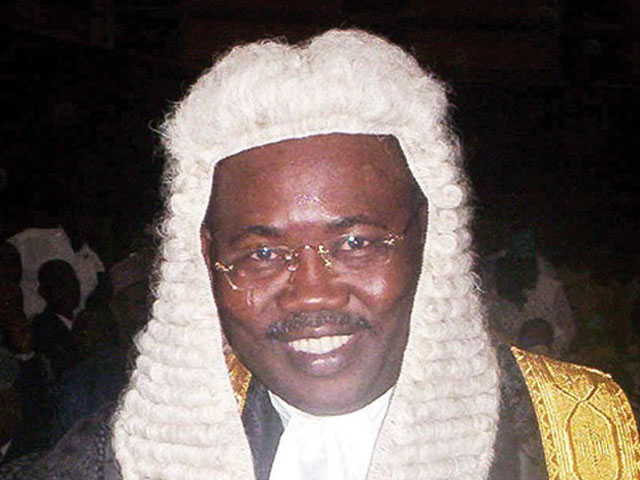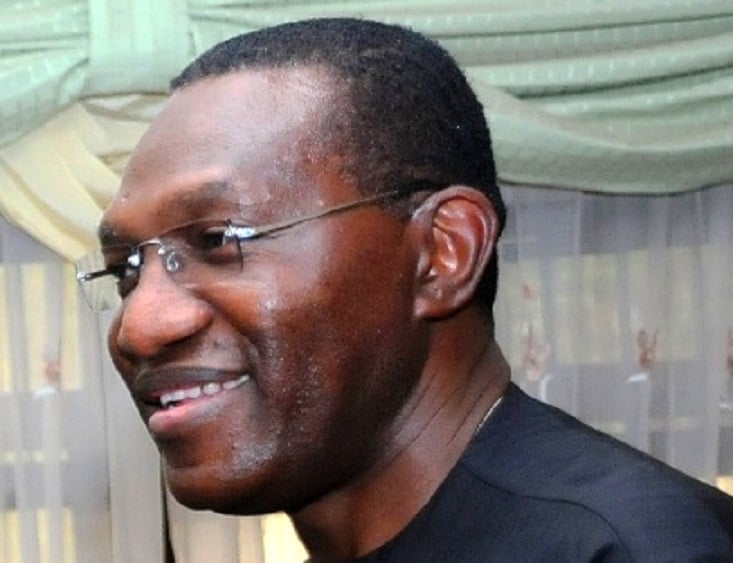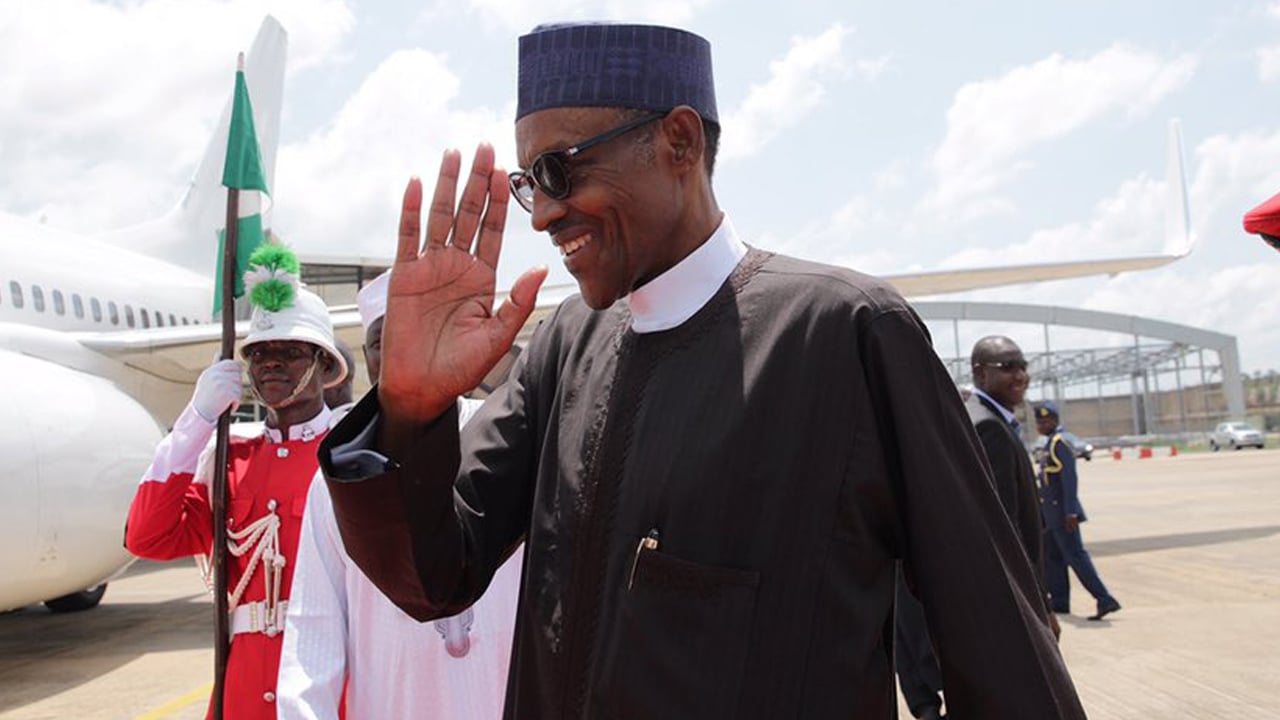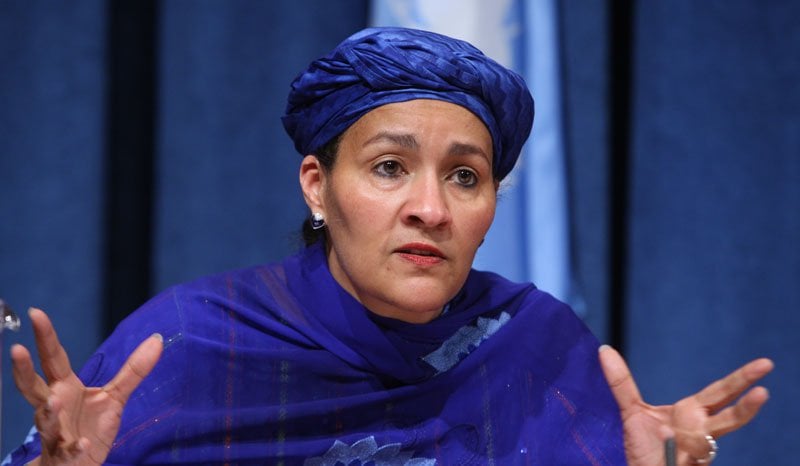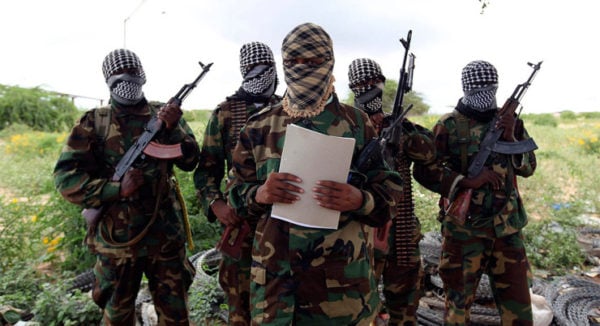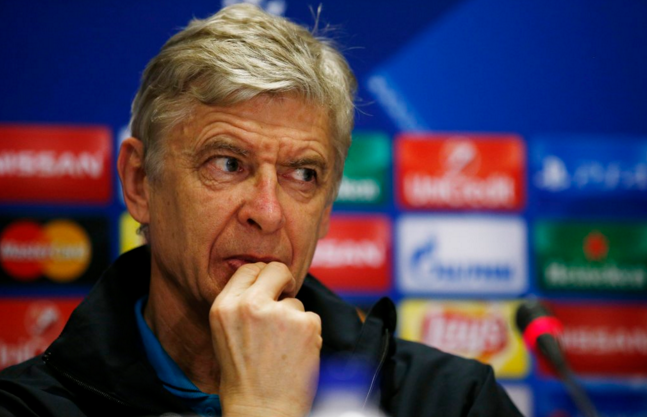BY BABAGABA BUKAR
On Friday, the 13th of April 2018, Justice Binta Nyako of the Federal High Court sitting in Abuja made a landmark pronouncement which, stripped of legal language, means when a minister acts as directed by the president, he or she cannot be held liable for the action. In other words, the minister is only carrying out an order of the president. Justice Nyako declared that by the provisions of sections 5(1), 147, 148 and 150 of the Constitution of the Federal Republic of Nigeria (as amended), the executive powers of the federation were vested in the President which he could exercise either personally or through any of his appointed ministers. This is the first judicial interpretation of these sections of the Constitution to the best of my knowledge.
Why is this judgment so significant? Mr. Mohammed Bello Adoke, who was Attorney-General of the Federation and Minister of Justice under former President Goodluck Jonathan from 2010 to 2015, had been charged to court by the Economic and Financial Crimes Commission (EFCC) for allegedly giving “wrong legal advice” to Jonathan in the settlement of the long-drawn dispute between the Federal Government of Nigeria and Malabu Oil & Gas Ltd over OPL 245. The oil prospecting licence had been awarded to Malabu Oil & Gas Ltd in 1998 by the government of the late General Sani Abacha. However, the licence was withdrawn by the government of former President Olusegun Obasanjo in 2001, who then awarded it to Shell. Meanwhile, the OPL 246 licence awarded to General TY Danjuma’s South Atlantic Petroleum on the same day as Malabu was not withdrawn by Obasanjo. Danjuma was Obasanjo’s Minister of Defence, though.
Malabu thereafter went to court to challenge the withdrawal of OPL 245 licence. Eventually, the Federal Government decided to settle out of court. This was in 2006. Shell was dissatisfied with the decision and opted to sue the Federal Government to the International Centre for the Settlement of International Disputes (ICSID), an arm of the World Bank, claiming at least $1.5 billion from Nigeria for alleged breach of contract. Shell’s internal memos later revealed, the international oil company was confident it would be awarded at least $2 billion. It appeared to be a bad case for Nigeria. This was the state of things when President Jonathan came to office in 2010. Malabu, whose beneficial owner had now turned out to be Chief Dan Etete, Minister of Petroleum under Abacha, raised the matter with Jonathan, who then decided to give effect to the out-of-court settlement reached by the Obasanjo government.
It was on the basis of the judgment that the Resolution Agreement was reached with Malabu. It provided the following terms: that Malabu waives all interests and rights in OPL 245 and agrees that it should be re-allocated to another entity; that Shell Nigeria Ultra Deep Limited (SNUD) agrees that its interest be reallocated to Shell Nigeria Exploration and Production Company (SNEPCo); that FGN will re-allocate OPL 245 to SNEPCo and Eni of Italy (also known as the Nigerian Agip Exploration, NAE); that the $207,960,000 deposited in an Escrow account at JP Morgan Chase Bank in London, UK, by SDPC will be paid to FGN as signature bonus for the re-allocation of OPL 245 to SNEPCo and NAE; that an Escrow account will be opened in the names of FGN and Malabu at JP Morgan; that NAE will pay an agreed sum to the account; that the money will be transferred by FGN to Malabu as its pay-off for giving up OPL 245; that NAE and SNEPCo will execute the PSC for OPL 245; and that all pending suits, and arbitration, will be withdrawn by all parties.
Advertisement
It was in the spirit of the Resolution Agreement that the transaction was concluded. Controversy would arise much later over the $1.1 billion payments made to Malabu; some campaigners in the UK started raising issues that it should have been paid to the Nigerian government, and that Malabu, the original owners of the oil block, should not have got anything. All these arguments, it would appear, were designed for OPL 245 alone. Original awardees of many oil blocks in Nigeria had been re-selling to IOCs for decades without any eyebrow being raised, but the campaigners sought to make a different law for Malabu. They may have a point, nonetheless. There are important moral questions that Etete was Minister of Petroleum when the oil block was awarded to Malabu, and he turned out to be the owner of Malabu, along with a son of Abacha. There is a legitimate question of conflict of interest. But fraud is a different kettle of fish which has to be legally established.
This is why I think the vilification of Adoke has been most unfair. Everything about OPL 245 has been pinned on him by the EFCC as if he was the one that awarded the licence to Malabu in the first place. You would also think he was the AGF that decided to settle out of court. You would think he was the one that ordered that $1.1 billion be paid by Shell and NAE to Malabu. You would think he was the one that said the money should not be used for healthcare and education. If you mention the name “Adoke” today, what comes to mind immediately is “OPL 245 fraud”. At least that is the impression I also had about him until last year when I started reading his own side of the story. He has been so damaged. Yet, it is becoming glaring that there is more to it than the EFCC is telling Nigerians. How can EFCC charge somebody to court for giving wrong legal advice “that made Nigeria lose money”? Even if he gave bad advice, is that a criminal offence? Everybody knows that the buck stops at the president’s table, as the Federal High Court has now ruled. It is commonsense. Adoke himself has said if Nigeria had not resolved the dispute with the Resolution Agreement, Nigeria would have been fined $2 billion by the ICSID.
It is an irony that when JP Morgan filed its defence in the ongoing case of “negligence” brought by the Attorney-General of Nigeria in a London High Court, nowhere was Adoke’s name mentioned. All the government officials that authorised the payment were named by the bank. These are: then Minister of State for Finance, Dr. Yerima Ngama; and then Accountant-General of the Federation, Mr. Otunla Ogunniyi. I have scanned through the court documents and nowhere was Adoke mentioned as authorising any payment. Yet he is the only (former) government official being prosecuted by the EFCC. Anybody who understands how government works will certainly come to the conclusion that there is something fishy going on. It beggars belief that only one official did something wrong in a matter that spanned the lives of four administrations, with four different AGFs!
Advertisement
Apart from accusing Adoke of giving “wrong” advice, the EFCC also said he collected a bribe. If this is true, then it is indefensible. However, Adoke told TheCable online newspaper last year that the money allegedly traced to him was in an unrelated mortgage he took from Unity Bank to buy a house in Abuja from one Alhaji Aliyu Abubakar, a property developer. Adoke said Unity Bank loaned him N300m, which it paid directly to Abubakar, and asked Adoke to make an equity contribution of N200m for the balance. Adoke said, however, that he could not sell the land from where he had hoped to raise his N200m equity contribution. Abubukar decided to resell the property to the CBN and then returned the N300m paid by Unity Bank. Adoke said: “I don’t know how he (Abubakar) paid back to Unity Bank. I don’t know if he paid them dollars, if he got the bureau de change to change any money, I was not aware. It was between him and the bank. But this is a simple question to ask: Malabu transaction took place in 2011. All the payment processes commenced 2011. I didn’t collect bribe in 2011. I didn’t collect bribe in 2012. It was now in 2013 that I would collect bribe on a transaction that took place in 2011. Please does that make sense?”
It is becoming difficult not to believe Adoke’s allegation that a powerful figure in the Presidency is using the EFCC against him. His allegation is that this figure (I think I know who he is talking about) wanted to be AGF in 2011 in a proposed “unity government” with the Action Congress of Nigeria (ACN) that eventually did not materialise. But Adoke got the nod instead. The supposed powerful figure is said to be holding a grudge that his nominations into positions in Jonathan’s government did not sail through and he thought Adoke was responsible for that. Adoke was said to be the most powerful minister under Jonathan, after Mrs Diezani Alison Madueke. Is that why the powerful man is using his absolute control of the EFCC to deal with the former AGF? Adoke said having searched everywhere to dig up dirt against him, including trying to find out if he benefitted from the 2015 election campaign funds and also probing the accounts of the Ministry of Justice during his tenure, and unable to find anything, the powerful figure decided to link the aborted mortgage deal of 2013 to the OPL 245 deal of 2011. If these allegations are true, then this is ungodly.
Now that the Federal High Court has ruled that Adoke cannot be held liable for carrying out a lawful presidential directive, at least one aspect of the charges is now standing on a weak leg. Also, with JP Morgan Chase Bank releasing the details of those who authorised the payments and with Adoke’s name not featuring on the list, it has become glaring that the EFCC is not telling Nigerians the whole truth. It also does not accord with common sense that bribes will be paid in 2013 for a transaction carried out in 2011. I am beginning to believe Adoke’s conspiracy theory. My understanding of how corruption is perpetrated in Nigeria is completely out of tune with that. If I were in a position to advise Adoke, I would tell him to come back home from self-exile and fight these guys to the finish. But since he says some people are out to kill him, those who can guarantee his security are in a better position to give him all the assurances he needs. However, except there are still hard facts hidden from the public, recent developments have vindicated Adoke in my considered opinion.
Bukar is the managing partner of Bukar and Bukar Associates, Area 11, Garki, Abuja.
Advertisement
Views expressed by contributors are strictly personal and not of TheCable.
Add a comment
